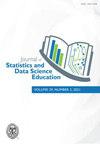Project-Based Learning Promotes Students’ Perceived Relevance in an Engineering Statistics Course: A Comparison of Learning in Synchronous and Online Learning Environments
IF 1.6
Q2 EDUCATION, SCIENTIFIC DISCIPLINES
Journal of Statistics and Data Science Education
Pub Date : 2022-09-27
DOI:10.1080/26939169.2022.2128119
引用次数: 2
Abstract
Abstract Understanding statistics is essential for engineers. However, statistics courses remain challenging for many students, as they find them rigid, abstract, and demanding. Prior research has indicated that using project-based learning (PjBL) to demonstrate the relevance of statistics to students can have a significant effect on learning in these courses. Consequently, this study sought to explore the impact of a PjBL intervention on student perceptions of the relevance of engineering and statistics. The purpose of the intervention was to help students understand the connection between statistics and their academic majors, lives, and future careers. Four mini-projects connecting statistics to students’ experiences and future careers were designed and implemented during a 16-week course and students’ perceptions were compared to those of students who took a traditional statistics course. Students enrolled in the experimental group (a synchronous learning experience) and the control group (an online learning experience) were sent the same survey at the end of the semester. The survey results suggest that the PjBL intervention could potentially increase students’ understanding of the usefulness of statistics and effectively enhance their perceptions of belonging to the engineering community. This study summarizes the results of this PjBL intervention, the limitations of the research design, and suggests implications for improving future statistics courses in the context of engineering.基于项目的学习促进了学生在工程统计课程中的感知相关性:同步学习环境与在线学习环境的比较
理解统计学对工程师来说是必不可少的。然而,对许多学生来说,统计学课程仍然具有挑战性,因为他们发现这些课程死板、抽象、要求高。先前的研究表明,使用基于项目的学习(PjBL)来展示统计与学生的相关性可以对这些课程的学习产生显着影响。因此,本研究试图探讨PjBL干预对学生对工程和统计学相关性的看法的影响。干预的目的是帮助学生理解统计学与他们的学术专业、生活和未来职业之间的联系。在为期16周的课程中,设计并实施了四个将统计学与学生的经历和未来职业联系起来的小项目,并将学生的看法与传统统计学课程的学生进行了比较。实验组(同步学习)和对照组(在线学习)的学生在学期结束时收到了相同的调查问卷。调查结果表明,PjBL干预可以潜在地增加学生对统计有用性的理解,并有效地增强他们对工程社区的归属感。本研究总结了PjBL干预的结果、研究设计的局限性,并提出了在工程背景下改进未来统计学课程的建议。
本文章由计算机程序翻译,如有差异,请以英文原文为准。
求助全文
约1分钟内获得全文
求助全文
来源期刊

Journal of Statistics and Data Science Education
EDUCATION, SCIENTIFIC DISCIPLINES-
CiteScore
3.90
自引率
35.30%
发文量
52
审稿时长
12 weeks
 求助内容:
求助内容: 应助结果提醒方式:
应助结果提醒方式:


